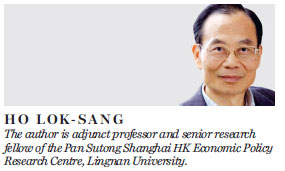HK can achieve growth beyond the 'new normal'
Updated: 2015-09-15 08:10
By Ho Lok-Sang(HK Edition)
|
|||||||
It seems that we are all accepting that 2 to 3 percent growth is the "new normal" of economic growth for Hong Kong. For the fourth year, Hong Kong is expected to grow no more than 3 percent this year. But Hong Kong can certainly do much better.
I am not saying that economic growth is what we should pursue. Certainly we do not want to pursue economic growth that undermines our living standards. Economic growth is only a means. Excessive focus on it diverts our attention away from something more important - quality of life.
Still, I am disappointed we have been performing well below our potential. Hong Kong is a small open economy and there are lots of things beyond our control. The economy on the mainland is slowing down, Japan is in recession, Europe is struggling to contain its problems and a strong RMB and US dollar are undermining our competitiveness.
Assuming that policies over the RMB and our linked exchange rate are not the things we can do anything about in the foreseeable future, there are still many things which can be done better.
At the risk of sounding repetitious, I want to stress that getting rid of the Special Stamp Duty (SSD) will greatly improve Hong Kong's economic growth prospects. In earlier articles, I have explained how the SSD has reduced the supply of starter homes and indirectly contributed to the spectacular increase in the prices of small flats and a reorientation by developers to produce more tiny flats at the expense of bigger ones.
It has not been properly appreciated how the SSD, by shrinking second-hand transactions in the property market, has contributed to the slowdown of the service sector.
In a vibrant economy, there will be upward mobility - upward mobility in earnings, upward mobility from generation to generation, and upward mobility in housing. There is a better life to look forward to and people work hard to achieve their dreams. In housing, in particular, there is something for everyone: The very poor who cannot afford market rents live in public rental housing; those whose financial wellbeing has improved and who have saved the down payments can afford something better. Those already living in owner-occupied housing, whose financial wellbeing has improved, can get better flats. They can vacate their former units which are filtered down to less well-off households. Hong Kong's SSD affects the SAR in a way unique to this city. In Singapore, which also has its own SSD (and which Hong Kong copied) starter homes are generally made available to Singaporeans through its Housing Development Board. Starter homes have not depended on the filtering down of older units. So the SSD has not hurt Singapore that much. Since private housing is such a small segment of the market, and since it is mainly the preserve of the rich, the SSD does not influence the economy there as much as it does in Hong Kong.
When people move up the housing ladder, those providing various services benefit. Brokers, banks, movers, furniture makers, decorators, lawyers, appliance sellers, all benefit in different ways. Thus housing transactions have a tremendous effect on the service sector. When external trade is weak, the service sector is vital. Because of the SSD, which was first introduced in 2010 and then strengthened in 2012, our service sector has suffered a continuous decline.
According to the Markit Nikkei Hong Kong Purchasing Managers' Index (PMI), the latest reading of 44.4 in August is the lowest since April 2009, and signals a sixth successive monthly decline. The timing of the decline of the PMI pretty much coincided with the introduction of the SSD in November 2010 and the strengthening of the SSD in October 2012.
A reading of 44.4 is a significant distance from the neutral reading of 50 and suggests contraction of the wider economy. Although I am fairly positive about exports picking up in the coming months, exports are more contingent on factors beyond our control. Abolishing the SSD, however, is well within our control. I understand that the SAR government is worried abolishing the SSD would trigger a jump in housing prices, but my own analysis says otherwise. It will instead trigger a dramatic jump in housing transactions, and will really kick-start the service sector. Housing prices will almost certainly be subdued because of the impending rise in US interest rates and because of the significant increase in supply, especially the supply of starter homes.
It will not be easy to convince the government or our lawmakers. However, the future of our economy is at stake. Abolishing the SSD may help us avoid a recession and will save jobs. I sincerely hope the government and our lawmakers consider it.

(HK Edition 09/15/2015 page9)